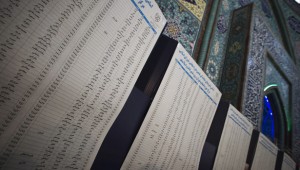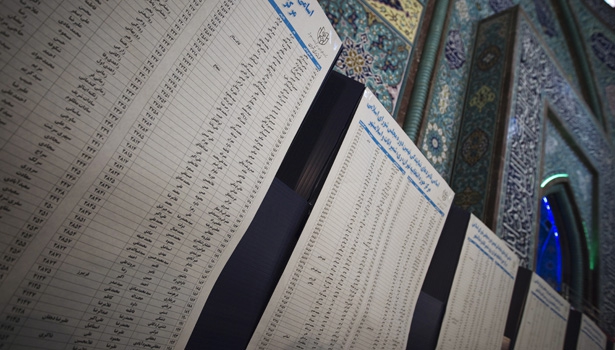 Why new efforts to change the Islamic Republic's electoral system could end up just favoring establishment candidates.
Why new efforts to change the Islamic Republic's electoral system could end up just favoring establishment candidates.There are months to go before Iranians choose a new president, but the Islamic regime already appears to be preparing the ground for a preferred candidate. A controversial election-reform bill working its way through parliament contains measures that could prevent undesirables from running while granting the clerical establishment greater control over the election's outcome in June 2013.�The bill, which passed in its first reading on December 2, would tighten an already strict vetting process for potential candidates by adding prerequisites for age, experience, and loyalty to the establishment.
Ironically, the proposed legislation has been criticized as unconstitutional by sitting President Mahmud Ahmadinejad, whose reelection in 2009 led to mass street protests amid claims that the result was rigged.�Others have suggested that the measures are intended to favor candidates close to Supreme Leader Ayatollah Ali Khamenei. They could also prevent 78-year-old former President Akbar Hashemi Rafsanjani -- who has angered regime loyalists over his support for the opposition movement -- from returning to office.
Under the bill, anyone running for president would have to be 45 to 75 years of age. They would have to receive the approval of 25 members of the Assembly of Experts -- a body of Islamic scholars that is tasked with electing the country's supreme leader. And they would need written approval from 100 members of the 290-member parliament.�Candidates would also be required to hold either a master's degree or the equivalent from a seminary of a traditional Islamic institution of higher education. Moreover, they must have eight years' experience in government posts.
'Religious and Political Personalities'
Under the current system, potential candidates must be 18 or older and are constitutionally required to be among the country's "religious and political personalities," hold Iranian citizenship, and believe in the principles of the Islamic republic.
If they clear those requirements, the names of prospective candidates are passed on to the powerful Guardians Council, which has the final say on who runs in the election. It has a history of disqualifying individuals on vague criteria.�Adding the additional condition that prospective candidates receive approval from religious and political figures, critics say, would make it impossible for independents to run.�Calls were made for electoral reforms after the 2009 election, when Ahmadinejad -- who at the time was seen as the candidate closest to Supreme Leader Khamenei -- won ahead of strong opposition candidates.
Germany-based political analyst Hassan Shariatmadari tells RFE/RL's Radio Farda that, rather than reforming the election process, the new bill would actually make it easier for candidates backed by the supreme leader to win.�"The tactical aim of this bill is to eliminate the candidates who could stand against the one supported by Khamenei," Shariatmadari says. "The intervention in the election process goes further than that because the bill aims at increased control over the implementation of the election because the engineering of the election and fraud" can be done openly.
Mehrzad Boroujerdi, a professor of political science at Syracuse University, suggests that "with this bill, [Iran] is moving toward the appointment of the [future] president rather than electing him."�He also notes the changes the reform would make to the role of the Interior Ministry, which is currently tasked with overseeing elections.
According to the bill, a new central commission would be placed in charge of the vote.�The new commission would have 11 members, including the state prosecutor, the interior minister, the intelligence minister, a representative from the parliament, and seven others. They would be chosen by the Guardians Council from a field of 30 individuals proposed by the Interior Ministry.
Opposition From Ahmadinejad
This could play into the hands of regime loyalists.�"As one could see from the reaction of [Ahmadinejad] and his friends, they are not happy that the Interior Ministry will lose more and more of its authority over the election," Boroujerdi says. "The control will be in the hands of bodies that are loyal to the leader."�Ahmadinejad, who fell out of favor with the supreme leader after the 2009 election, cannot run again. But he has been a vocal critic of the bill, saying it would predetermine the outcome of the vote.
On December 3, Ahmadinejad claimed that the proposed electoral reform threatened to place the vetting of potential candidates in the hands of people who have no such mandate.�"The move itself goes against the constitution, and the people's time and money should not be used for this plan," he said.�Ahmadinejad's reelection in 2009 was marked by mass street protests that presented the Islamic republic with a severe crisis and left it facing widespread criticism for its use of violence in quashing the unrest.
Now under intense international pressure over its controversial nuclear program, the establishment is seeking to hold a peaceful election and claim popular support.�Supporters of the bill, including parliament speaker Ali Larijani, claim that it is aimed at preserving freedoms and ensuring that the election is calm and healthy.�In reaction to claims that the bill is unconstitutional, Larijani said that is up to the Guardians Council to determine. For the bill to become law, it must clear the council, whose members are directly or indirectly appointed by Khamenei.
Intensified Speculation
Aside from former President Rafsanjani, who is considered by his supporters to be the only figure capable of pulling Iran out of its current crisis, the proposed bill could also negatively affect other potential candidates.�Key among them is Esfandiari Rahim Mashaei, a close aide to Ahmadinejad. The president has been accused of seeking to steer Mashaei into office in order to retain influence.�This week, Mashaei reportedly resigned as Ahmadinejad's chief of staff to take an appointment as presidential adviser and head the Secretariat of the Nonaligned Movement, which Iran currently chairs.
The move intensified speculation that Mashaei was getting ready to launch a presidential run, although his candidacy is given little chance of clearing the Guardians Council's vetting process.�Amid the intensification of the power struggle in Iran over the election-reform bill, members of a committee to supervise the next presidential election were introduced on December 3.�The committee comprises a number of hard-line politicians who are said to be loyal to Khamenei, including the head of the Guardians Council, Ayatollah Ahmad Jannati, and former judiciary chief Ayatollah Mohammad Yazdi.
By The Atlantic
The Iran Project is not responsible for the content of quoted articles.











